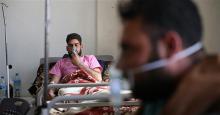Organisation for the Prohibition of Chemical Weapons
Statement by the Foreign Affairs Council on the Salisbury Attack
The European Union strongly condemns the attack that took place against Sergei and Yulia Skripal in Salisbury, UK on 4 March 2018, that also left a police officer seriously ill. The lives of many citizens were threatened by this reckless and illegal act.
Experts: The Damascus Regime is Responsible for Three Sarin Attacks
Experts from the Organization for the Prohibition of Chemical Weapons (OPCW) have come to the conclusion that the Sarin Negative Para Gas, which was used in the major chemical attack on the Ghouta suburb of the Syrian capital Damascus on August 21, 2013, is from the gas reserves in the army of the Syrian government, said diplomats and scientists to Reuters.
UN Council Rejects Russian Draft on Syria Gas Attacks Probe
The UN Security Council on Thursday rejected a Russian-drafted resolution that would have extended a UN-led investigation of chemical attacks in Syria but with changes to the panel, AFP reported.
Sarin gas used in Syria: Watchdog
The head of a global arms watchdog said April 19 that "incontrovertible" test results from an alleged chemical strike in Syria showed sarin gas or a similar substance had been used.
- Read more about Sarin gas used in Syria: Watchdog
- Log in to post comments
Russia-Turkey agree to support OPCW investigation into Syria attack
President Recep Tayyip Erdoğan and Russian President Vladimir Putin discussed the latest developments in Syria by phone on April 13 and agreed to support an investigation by the Organization for the Prohibition of Chemical Weapons (OPCW) into the use of chemical weapons in northern Syria.
Samples from Syria's Idlib test positive for sarin gas: Chemical weapons organization
Samples taken from a suspected poison gas site in Syria's northern Idlib governorate tested positive for the nerve agent sarin, the British delegation at the Organisation for the Prohibition of Chemical Weapons (OPCW) said on April 13.
Turkish Health Ministry says initial findings point to sarin gas in Syrian attack
The initials findings collected from autopsies conducted on three Syrians who died after being brought to Turkey for treatment after a suspected chemical gas attack in Syria's northern Idlib province suggests sarin gas was used in the attack, the Turkish Health Ministry said April 6.
Autopsy results show chemical weapon used in Syria's Idlib attack: Turkish justice minister
Autopsy results show that chemical weapons were used in the April 4 attack in Syria's Idlib, Turkish Justice Minister Bekir Bozdağ has stated.
“Extremely worrying” signs that ISIS use chemical weapons
A global watchdog reported that there are “extremely worrying” signs that ISIS may be making its own chemical weapons and may have already used them in Iraq and Syria.
The head of the Organization for the Prohibition of Chemical Weapons, Ahmet Uzumcu, said his teams have found evidence of the use of sulphur mustard in attacks in the two countries.
UN expected to approve resolution on Syria chemical weapons
The U.N. Security Council is expected to unanimously approve a resolution on August 7 aimed at identifying those responsible for using chlorine and other chemical weapons in attacks in Syria that have killed and injured a growing number of civilians.










